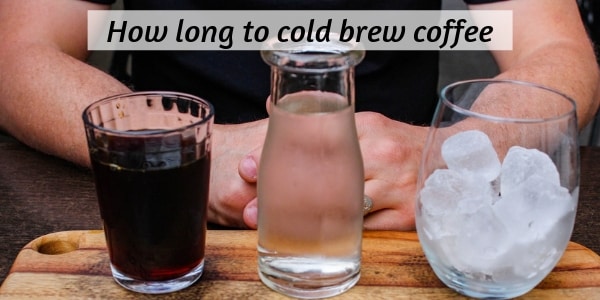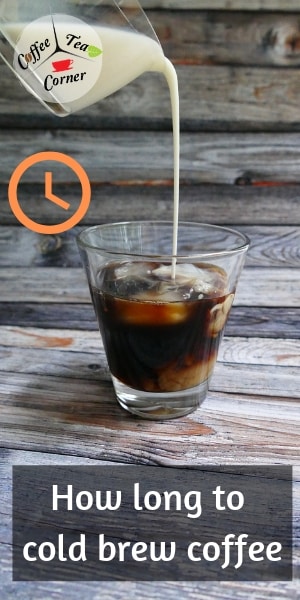So you're looking to make cold brew coffee and you're not sure how long to let it steep. No worries, this is a question I can help you with. The length of the steeping process can change the final flavor of your drink, so we'll talk about that too.
Table of Contents
So how long should you brew cold coffee ?
You should cold brew coffee for about 16 hours. After the first 8 hours the caffeine is infused into the water, and the more you let it sit the more flavor will be extracted from the ground coffee.
The first 8 hours are when the caffeine in your coffee is extracted, no more will steep after that. But the flavors and different fruity or chocolate notes only come out after the first 8 hours.
So you can leave your coffee to brew for 12 hours, even 14, or 18 depending on what you're looking for. The closer you get to 24 hours the less differences you will get.
This is something you'll have to experiment with, so you can find the optimum range for your preferred brew. Now let's see about the cold brew process in more detail.
If you want to make the best coffee at home, you absolutely need to check my article on the best coffee gear.
Most of the caffeine is done in the first 8 hours
Caffeine is water soluble, so it will eventually mix into your brew no matter what you do. It's also heat-sensitive, which is why hot brew coffee works so fast.
But, even with hot brew coffee there is a point after which caffeine stops extracting. For hot brew coffee that's a little under the 5 minutes mark of the coffee grounds being in contact with the hot water.
The larger the grind, the slower the release of caffeine but you get a nicer flavor in your coffee. Differences in grind size matter.
This is why brewing methods like French press gives us such a great cup of coffee, as it uses coarse grounds. As opposed to the drip filter, which uses much smaller grounds, which you'll see produce a different flavor.
If you opt for a smaller grind, like for an espresso, you'll get less of caffeine, but in a shorter amount of time, and the flavor will be different.
What about cold brew coffee though ? Here the mark for when caffeine stops extracting is much more flexible. It varies from coffee bean to bean, and a slightly warmer water will extract it faster.
But the interval is between 4 and 8 hours after you've started brewing the coffee. And no it won't lose its caffeine in time.
That being said, coffee brewed in the fridge at a very low temp will need those 8 hours to release all the caffeine. At room temp though, the 4 hours might be enough.
Even so, you'll need more than just 8 hours to cold brew a good cup of coffee. Using fresh coffee beans, or at least grinding your coffee right before you start brewing will also help the caffeine release faster.
Steeping in the fridge vs steeping at room temperature
When you steep in the fridge your coffee will inevitably take a longer time to brew. This is part of the reason I did not give you a very specific answer carved in stone.
Some might brew their coffee in the fridge, some might leave it on the counter overnight. Both ways are fine, just make sure your brewed coffee ends up in the fridge so it will keep for longer.
So if you're steeping your cold coffee in the fridge, your caffeine will be ready only after those 8 hours have passed. Then, you will need to allow the coffee more time to release its flavors.
It will happen slower than with room temp coffee, but again after 24 hours there is no point in letting it steep anymore.
If you're brewing on the counter, then your caffeine will be ready much faster, somewhere between 4 and 6 hours might just be enough to get all of it out. And here too you'll need to let the coffee steep for much longer to get the full flavor.
This all depends on the kind of coffee bean you use. Some might release more caffeine than others, like the Robusta which has double the amount of caffeine of an Arabica.
So this all means that you should know that even if you leave an Arabica to steep on the counter, it will still have less caffeine than a Robusta brewed in the fridge.
And Robusta might just develop a sweeter taste in a cold brew, even if it's usually a very poor coffee.
But as you'll see, the difference between Arabica and Robusta won't be much of an issue in terms of taste with cold brew coffee.
Adjust your coffee types to the kind of brew you like
We each take our coffee differently. Some might like it black, and some might like it as an iced latte with barely any coffee, and everything in between.
Still, there are some coffees that brew better black and some that go better with milk and sugar. With hot brewing this means that you'll have to be careful which kind of coffee bean you use.
Flavor and caffeine act very quickly in a hot brew and a Robusta can brew past the pleasant point faster than you'd like. Not with cold brew coffee, though.
Here the process is so slow that you're going to have plenty of time to even test your brew, so you will know when it's best for your taste buds.
This also means that you can be very picky about the aroma of your coffee, more so than with hot coffee.
So for example if you like your coffee black, you'd usually go with an Arabica for hot brews. You can do that with a cold brew as well, and the berry and fruity notes would be clearer in a cold brew.
You'd need an African coffee to get those berry notes, since they're famous for that flavor profile. African coffee is very much on the lighter, fruity side, sometimes resembling a good wine.
Geography and climate play a huge role in what your coffee tastes like, hot or cold.
Even the actual temperature difference between a hot and cold brew will make some notes seem stronger. So a darker, chocolate tones Latin American coffee will taste different in a cold brew than it would in a hot brew.
In a cold brew you will be able to taste the subtle cocoa notes in your coffee, as opposed to a hot brew. In a hot brew you risk burning the delicate notes with water too hot, or letting it steep for too long.
This also means that you'll be able to enjoy the rich, full-bodied Robusta without too much of the bitterness and harsh flavor usually found in a hot brew Robusta.
In general cold brew coffee will be milder in taste and sweeter. It will be as strong in caffeine as a hot brew, but it has a different taste than a hot brew and this is what many folks are looking for.
(If you like this article so far, you can pin it to your Pinterest board by clicking the image below. The article continues after the image.)
How to make cold brew coffee at home
Usually when we talk about cold brew coffee we're talking about coffee we got from a coffee shop. This is something that's become very common in the past few years, and I can see why that's so.
It is a time consuming task, even if you're not actively doing anything to the coffee while you're cold brewing it. You still have to wait all those hours to get your cup.
So I can see why just going to a coffee shop and getting a cup of cold coffee that's already been made is more convenient.
There's no reason you shouldn't have that tasty, beautiful brew in your own home, though. After all, cold coffee can be made by the gallons and it will last for days.
So how do you make cold brew coffee at home ?
Simple, you'll just need a few things you probably already have at hand:
- one very clean, very large glass jar with a sterilized lid to go with it
- a large amount of coffee
- clean, fresh, possibly filtered water
The way this works is that you add the coffee to your clean glass jar. Then, you can add all the water cold, or heat it up slightly, to about 30 C/86 F to jumpstart the process.
Whether you add the water ice cold or a little warm is up to you. It will end up very cold anyway. Once you add the water, you'll see the coffee starting to puss up a bit, maybe produce a bit of foam.
That's alright, and it means it's blooming. This is also the time in which it will release any CO2 that it needs to, so don't cover it just yet. Let it breathe for about half an hour, then cover it tightly.
You can leave it on the counter if you have space and you know your cat won't knock it over in the night. Or, you can leave it in the fridge and leave it for a few hours longer.
As for the coffee grinds themselves, you should opt for a larger grind. Something like a medium, or whatever you would like to use for a French press will work fine.
Just make sure you don't have a very small or fine grind, like for an espresso. Your coffee will be alright, but it will be much cloudier and harder to strain or filter properly.
And for the water and coffee ratio, that's up to you. Brew it with the same measurements as you would use for your regular, hot brew coffee. If you're worried it will be weaker than a hot brew, don't be.
This coffee will have a different taste, so keep that in mind. But it's still coffee that's left to brew for up to 24 hours, so flavor and caffeine should not be a problem.
Just keep in mind that if you're going to serve it over ice you should brew it stronger than usual. If you're adding lots of milk and sugar afterwards, again brew it stronger so the taste will shine through.
Filtering your cold brewed coffee
When you're happy with how your cold brew turned out and you're ready to serve it, you will need to filter it. This is something that many things can help you with, but it depends on what you're got at hand.
The best would be a sheer, fine muslin cloth. It will trap both the large and small particles in your coffee, and your brew will be very clean. Of course, this means rinsing and washing the cloth each time after brewing coffee.
If you've got no muslin cloth, then a very fine sieve or mesh or strainer will do the job too, but it won't be as clean.
Another thing you can use is your everyday paper filters for your drip filter machine.
This means that you will need to change the filter several times while decanting your coffee, since a whole lot of coffee grounds will end up in the filter and it will overflow very fast.
You can always use a dedicated cold brew filter for your coffee, and this means making your entire coffee in that filter. It works a lot like a regular hot filter, except this one is cold and it's easy to remove from your brew when you're done with it.
For example this one can brew 2 quarts of coffee. That's 1.9 liters of cold, fresh coffee and you'll have a strong mason jar to store it all in.
The best thing about it, aside from being so large, is that the filter is inside the jar and is easy to remove, clean, and then reuse.
The lid is airtight, and everything fits nicely in the fridge. And dishwasher when necessary.
You will also get instructions on making your cold brew coffee when getting this jar, so you're pretty much covered.
You can check the listing on Amazon here, and read the reviews as well.
Cold brew coffee can last for up to 2 weeks in the fridge
Once you're done brewing your cold coffee, you can enjoy it for several days, even up to 2 weeks. However I doubt it will last that long in the hot summer days.
But in general, seeing as it's a coffee that's already brewed at a low temperature it won;t lose flavor too quick. The only thing you should worry about is the brew absorbing flavor from the rest of the items in your fridge if you didn't put the lid on well enough.
However I would recommend you finish up your cold brew coffee within the first week. The flavor will start to decline after a while, and it's best to enjoy your coffee before it even gets there.
Final thoughts
Cold brewing coffee at home is a nice way to start your summer, or even winter if you're into cold drinks in the winter time. I know some people might be drinking cold coffee for the flavor rather than the temperature.
Still, it's a whole other animal than hot coffee, and it's going to give you a different experience when you first try it. So give it a go, whether you make it at home or get it from a coffee shop.
Just make sure you keep your mind open to that change in flavor, since it won't be like your usual hot cup. You might like it better.
If you want to know more about coffee or tea, feel free to check the related articles below. Who knows what else you might find ?







